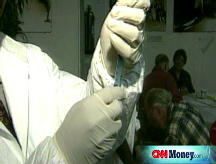Boomers won't bust us - Health care will
As the general election campaign heats up, you'll hear more about a looming entitlements crisis. And there is a real problem.
 |
| Pat Regnier's column "The Bottom line," appears monthly in Money Magazine. Email him at pregnier@moneymail.com |

| MMA | 0.69% |
| $10K MMA | 0.42% |
| 6 month CD | 0.94% |
| 1 yr CD | 1.49% |
| 5 yr CD | 1.93% |
(Money Magazine) -- Entitlement has become a bit of a swear word. In Washington, D.C., it's technically a nonpejorative term for government programs like Social Security and Medicare that aren't subject to the usual budget process.
But what many pundits and pols who talk about entitlements really mean is: Look at all those aging boomers who think they're entitled to every penny of younger generations' tax dollars.
As the general election campaign heats up, you will surely be hearing more about a looming entitlements crisis. And there is a real problem. Thanks largely to the projected growth of entitlement programs for seniors, the federal government is already on the hook for about $54 trillion over the next 75 years. That's trillion with a T. It's hard to know where to begin solving a problem this big and tangled. But here are a couple of things worth thinking about.
Can we tone down the old-vs.-young rhetoric? Because entitlements are a "pay as you go" plan - that is, they're funded by taxes of current workers - the issue is often framed as a sort of intergenerational warfare.
But the seniors who collect benefits aren't aliens who came down to Earth for the early-bird special at Denny's. They are, mostly, the people who changed diapers and paid tuition for the working generation. They're family.
As the economist Robert Shiller has observed, the safety net for the elderly has always been a pay-as-you-go system financed by the young. Before Social Security and Medicare, your parents simply moved into your house.
According to one study, the share of widows living with their adult kids fell from nearly 60% in 1940 to just 20% in 1990. I love spending time with my folks, but I'd want to be very, very careful messing with this.
That doesn't mean the current system must be sacrosanct. Still, as boomers age and start needing costly long-term care, which Medicare rarely covers, I suspect that many of their Gen X children are going to be demanding a stronger safety net, not a weaker one.
Let's focus on the real problem: health-care costs. Social Security is actually a relatively small and fixable piece of the entitlement puzzle. Medicare for the old and Medicaid for the poor are the programs that really threaten to swallow up the budget.
The federal deficit, not counting interest payments, could eat up 9% of GDP by 2050 if business continues as usual. According to Brookings Institution economist Henry Aaron, the two big federal health programs account for nearly all of the gap (see above and right).
The main problem is not the demographic bulge of baby boomers, says Aaron. It's that health-care costs overall, for private payers as well as in Medicare, are growing about 2.5 percentage points faster than the economy every year. New drugs, procedures and technologies keep upping the ante, even when we aren't sure if they work better than what came before.
If we could get a grip on runaway cost growth throughout the system - not just for old folks - we'd solve much of the budget problem. And we could even afford to cover everybody. As a practical matter, Aaron argues, the two reforms must go together.
Well, if that's all...okay, this is a tough one. Barack Obama's not-quite-universal health plan identifies places to save but doesn't say how it would enforce budget discipline. While John McCain wants to hold down spending by making people bear costs more directly, he punts on ensuring that they get the coverage they need.
And both candidates want tax cuts that keep digging the budget hole. Here's hoping the candidates get serious and specific about this in the coming debates. I think we're entitled.
How does your religion affect your finances? Money Magazine is seeking families willing to discuss the dollars-and-cents expenses involved in practicing their faith - the cost of everything from religious schools and dietary restrictions to tithing and faith-based investment limitations. If interested, please email your name, contact information and family snapshot, along with a brief summary of your salary, savings and religion-related expenses, to gmannes@moneymail.com. ![]()


